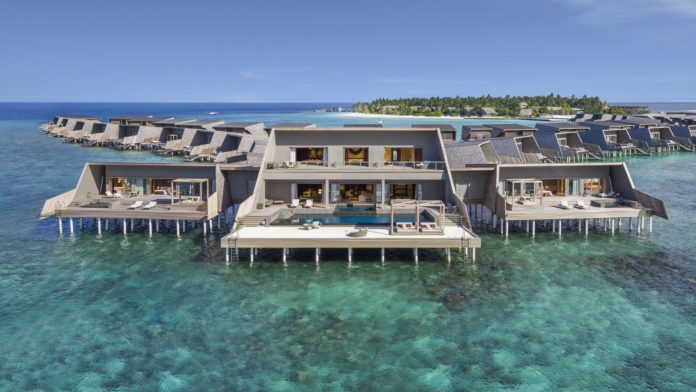
Wonderful Copenhagen just announced that they are ditching their traditional DMO’s role and focus on a brand new destination strategy that will lead them through 2020 and beyond. We at Corporate Maldives have broken down this strategy and shared our views on how Maldives can relate to such a modern-day strategy in terms of tourism.
Along with their consultation partners, Wonderful Copenhagen outlines their seismic shifts in the DMO’s role. They believe that the Destination Marketing Organization (DMO) role has expired as a promotional superstar. This is very true in terms of Maldives Marketing & Public Relations Corporation. A few years back, their strength went from lending out resort islands to championing marketing campaigns for Maldives across the globe. Now, their public role seems to be participating in key tourism trade fairs along with their loyal partners. Is this a shift in roles? Or perhaps the private sector has started playing their part in marketing the destination. Hosting the first Travel Trade Maldives as well as Maldives Travel Awards are key events that took place in 2017 alone to promote Maldives as a destination.
According to Wonderful Copenhagen, they are ditch equating tourism marketing with glossy-perfect advertising. In the case of the Maldives, we do not see the need to spend million on a 30 second BBC news time add, rather host a travel writers conference in Maldives giving bloggers, Instagrammers the chance to spread the word about the destination by being in the destination itself. Wonderful Copenhagen is also bidding farewell to culture and leisure. In the case of Maldives, undoubtedly we will not be entirely moving on from culture. Culture tourism is still a niche but is expected to grow widely. Maldives currently hosts celebrity tennis trainers, wellness symposiums, gyms with island views, kite festivals and strong art initiatives highlighting the shift from typical water bungalow leisure tourism.
Lastly, Copenhagen waves goodbye to the mass consumer and passing days of disconnected tourist segmentation between business and leisure. Maldives has been on a similar path for some time now. Sonevafushi Maldives has the largest telescope in the Indian ocean where tourists can stargaze, while Paradise Island resort opened up a world-class meeting and exhibition venue. You can easily be at 2 places within a span of a day.
Despite all these omissions, Copenhagen sees a future where people are at the centre of its vision. With their tagline of “local hood for everyone”, they encourage its visitors to think as temporary residents, instead of tourists. Similarly, Maldives launched the first ever Maldives Ambassador Programme (MAP) in 2016 which is an invitation-only network of well-connected and socially active individuals in key markets, with the aim to not only globally promote Maldives as the ultimate holiday destination but also as a world-class destination for tourism-related ventures. Such key influencers could turn regular individuals into Maldivian brand champions. MMPRC also initiated a photography ambassador program earlier this year. These photographer’s images are promoted across the world in order to promote the destination. Following in their footsteps, any tourist visiting the country with a cell phone could be a brand ambassador.
Outlined five strategic coordinates to keep the destination on track:
- Shareability is king: With the rise of social media, a digital word of mouth recommendations is more important than ever before. We need to enable travellers, partners and influencers to create shareable moments that will not only enhance their voice in the digital conversations but propel those particular moments past competing messages in the receiver’s newsfeeds. The Turtle Sanctuary in Banyan tree Maldives as well as the Manta Ray sighting in B Atoll Biosphere Reserve are great touristic marvels but at the same time needs extreme awareness efforts.
- Once attracted, twice valued: We need to generate more value from the visitors, we have already attracted. And we need to inspire them to do more, stay longer or come back on another occasion. The first step is to use data and updated visitor insights to identify and remove the weak points of our destination. Not just to improve visitor satisfaction levels – but to minimize the path to purchase and increase the desire to recommend and return. Unlike Denmark, Maldives has long been a repeaters paradise. More and more visitors are opting for value-added products. Hurawalhi Island Resort is home to the world’s largest undersea restaurant while Six Senses Maldives opened up the first Earth Lab driving more value and longer stay periods.
- Tomorrow’s business today: By 2020, international passenger arrivals are expected to reach 1.6 billion people globally. We need to tap into this long-term potential today by increasing familiarity with our destination and continuing to attract new travelers from the markets with the highest business potential. Gastronomy Tourism is something Maldives can work on while Maldives tends to move on from traditional markets to markets such as Scandinavia and the United States.
- Co-innovation at heart: By sharing ideas and co-creating shareable moments, we can reach our mutual goal of attracting more business to our destination. We are simply stronger when we join forces. However, to succeed we all need to work together – not just the existing and established industry players but the newcomers and start-ups as well. Maldives actively looks for volunteers to take part in Research-based conservation in the Maldives in protecting endangered whale sharks.
- People-based growth: As we strengthen the efforts to attract more visitors, we must keep in mind both the livability of the locals and the great visitor experience. In other words, we need to facilitate the meeting between locals and visitors. If we fail to do so, we simply risk that the locals will turn against tourism – and vice versa. Looking at it like this, visitor growth in itself is not a goal. Increasing the value of visitors for all parties is.
Copenhagen and Maldives are miles apart in terms of their tourism activity, the type of tourists they attract. But we can all agree on one thing. Saying goodbye to the role of traditional DMO’s is extremely important to the Maldives. Arguably we have outrun the role of a typical mass tourism destination and surely we can learn from the strategic coordinates Copenhagen is following.
Source: Wonderful Copenhagen Review












